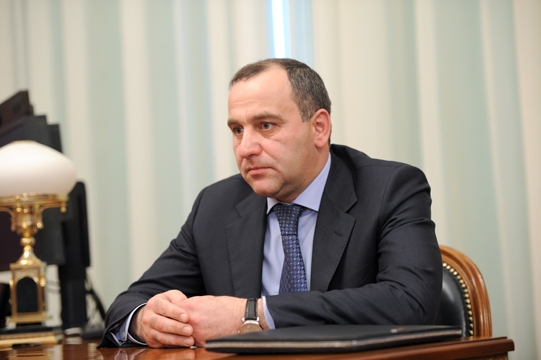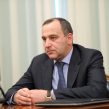
Moscow Moves to Change Rules of the Game in Karachaevo-Cherkessia
Publication: Eurasia Daily Monitor Volume: 11 Issue: 23
By:

On January 30, civil activists in Karachaevo-Cherkessia appealed to republican Interior Minister Kazimir Botashev, calling on him to provide answers about high-profile murders in the republic in recent years. “We know that the murderers in some of these crimes were found and punished,” the appeal read. “But the enduring silence about the progress and results of the investigation, especially concerning the names of the people behind these heinous crimes, causes not only people’s distrust of law enforcement agencies and local authorities, but also generates unnecessary conspiracy theories that sometimes tarnish the reputation of good citizens” (https://kavpolit.com/najti-zakazchikov-i-ispolnitelej-ubijstv/).
Karachaevo-Cherkessia has been relatively quiet in recent years in terms of insurgent activities. Yet, political murders have proliferated in the republic. The authorities have been grappling with investigating a number of notorious crimes. A member of the republican parliament, Alexei Strigin, was murdered along with his driver back in 1998 and found only seven years later. The head of the detention facility in the city of Cherkessk, Khasan Janaev, was killed in 2006. A member of Karachaevo-Cherkessia’s parliament, Islam Krymshamkhalov, was gunned down in Cherkessk in 2009. Fral Shebzukhov, an aide to the president of Karachaevo-Cherkessia, was killed in 2010.
The level of corruption in Karachaevo-Cherkessia is perhaps best illustrated by one of the most bizarre political events in modern history of the Russian Federation, which took place in the republic in the fall of 2004. Crowds of angry protesters ransacked the government building in Cherkessk, forcing Karachaevo-Cherkessia’s then-president, Mustafa Batdyev, to flee his office. Protesters seized the government building following the harrowing killing of seven local businessmen at the dacha of the republican president’s son-in-law, Ali Kaitov (https://2004.novayagazeta.ru/nomer/2004/79n/n79n-s12.shtml).
In what was likely an effort to improve the criminal situation in the republic in the run-up to the Olympics in Sochi, a new republican interior minister was appointed in June 2013 (https://www.kp.ru/online/news/1472829/). The unusual feature of the new interior minister was his Karachay ethnicity. In the North Caucasus, Moscow normally avoids appointing people from local ethnic groups unless it is essential for keeping the situation under control. Apart from Karachaevo-Cherkessia, only Chechnya and Dagestan are currently “allowed” to have interior ministers from their respective republican ethnic groups.
After Karachaevo-Cherkessia’s interior minister was replaced, the republican government was repeatedly shaken by the arrest of officials for alleged corrupt behavior (https://www.moscow-post.com/politics/siloviki_zachischajut_ministrov_termezova11984/), culminating in December 2013 in the arrest of one of the most influential businessmen in the North Caucasus, Magomed Kaitov (https://www.vz.ru/politics/2013/12/16/664230.html). Observers started to wonder if Moscow was gradually sidelining the head of Karachaevo-Cherkessia, Rashid Temrezov, who has held office since 2011 and is known to be close to the notorious former president of the republic Mustafa Batdyev.
Karachaevo-Cherkessia rarely makes the headlines in the North Caucasus these days because there is relatively little insurgency-related violence in the republic. However, this relative serenity may be quite misleading. In 1999, Karachaevo-Cherkessia experienced one of the most violent regional presidential campaigns of all of Russia’s regions. In 2004, the angry crowds besieged and took over the government building. In 2011, the then-president of Karachaevo-Cherkessia, Boris Ebzeyev, resigned from his position before the end of his first term, reportedly under pressure. Political murders have taken place throughout 1990s and 2000s.
Even though the insurgency is not very active in Karachaevo-Cherkessia now, it used to be a very significant force. North Caucasian fighters in Syria recently tried to rekindle the insurgency in the republic, which had been decimated by government forces. Last month, a group of masked insurgents claiming to be in Syria addressed the Karachay people, asking them to kill security personnel, to attack places they perceive to be morally decadent and to promise to join the insurgents in the North Caucasus (https://www.islamdin.info/2014/01/blog-post_21.html).
Karachaevo-Cherkessia is a small republic (with a population under a half million) located between Kabardino-Balkaria and Adygea. In 1990, the republic seceded from Stavropol region to form its own administrative unit within the Russian Federation. Ethnically highly diverse, Karachaevo-Cherkessia is home to indigenous populations of Turkic-speaking Karachays and Nogais, Cherkess (a.k.a. Circassians), Abazins (who are related to the Circassians) and a large population of ethnic Russians. Joseph Stalin exiled the Karachays en masse in 1943 for their alleged mass collaboration with the Germans.
Yet while there has been no lack of grievances in the republic, the situation in Karachaevo-Cherkessia has been relatively quiet in recent years. One likely reason for the relative stability is the fact that Karachaevo-Cherkessia’s elites received much-desired autonomy after seceding from Stavropol region and have been content with their newly-acquired level of independence. Another factor may be that Karachaevo-Cherkessia’s elites were allowed to have relatively high involvement in decision-making processes in the republic. Thus, in 2011, Moscow consented to the resignation of Ebzeyev, despite the fact that he had no strong ties in the republic, had made his career outside the North Caucasus and Russia, and was therefore much preferred by the Kremlin as a leader of the republic than his successor, Rashid Temrezov, who was deeply embedded in the regional elites’ network.
The Russian government has indicated that it is moving to disrupt the local clan networks in Karachaevo-Cherkessia and draw up new rules of the game. The risk to the central government, however, is that this disruption could break the political balance in this complex republic and derail its fragile peace.




